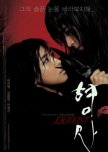
Duelist is a painting in motion, where a lot is hinted and nothing is explained.
Some may lament the lack of a true plot, but on my part I believe a movie has different means of portraying a story than a book or a drama. It's based upon images, not necessarily on twists and events. Just like poetry is based upon the evocative power of words, not on facts.
And the direction used the cinematographic tools to its full potential in this movie.
I watched it with my mouth open. Beautiful screenplay, beautiful dance-like fights, beautiful just-hinted erotism.
Yes, the plot can be reduced to a 10 minutes narration. But so are a lot of theatre pieces, played upon style, movement, colour and photography.
Acting is wonderful, and so is the music. This is a ballet, after all.
Rewatch value is obviously high: I'll go back to it whenever I want to just sit and admire a beautiful, colour filled painting.
Was this review helpful to you?
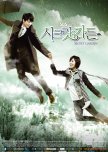
I even managed to regain my composure after the initial excitement, let some time pass and cool down, in order to look at it with a less passionate, more objective stance. The result is, SG remains my all time favourite, a drama I have watched and rewatched and will watch again until the characters and the script will be integral part of my life - perhaps they already are.
The plot speaks fot itself. There is fun, romance, magic, tragic, twists and literary references. It flows without interruptions, making you laugh like crazy and cry like a baby, at times flooding you like high tide, but it never leaves one dry or unsatisfied: questions are answered, references fulfilled, all spiced up with a little magic.
The script is unique and brilliant. The funny lines are hilarious, the serious ones thought-provoking. Nothing about this script is either predictable or shallow, making the characters come to life and become realistic in a fantasy world.
Which inevitably leads me to the acting, which is outstanding. The main leads have to play the part of themeselves, then that of the other, then that of the other playing the part of themselves. Lesser actors would have screwed up, but Ha Ji Won and Hyun Bin both do a fantastic job, providing laughters in heaps and tears in the same amount. And their love story is just as beautiful as their chemistry on screen is sizzling.
The secondary characters are not mere supporters. They are all interesting, complex personalities who adds to the plot and the dynamic wonderfully.
The music is addicting, even for a K-pop ignorant as myself. Songs and lyrics are never chosen randomly but highlight and define the scenes they soundtrack.
I can't ask more of a drama. In fact, I doubt I'll find something to fully compensate for the end of this wonderful show.
Was this review helpful to you?

End of review, thanks for reading.
Indeed, I could end my review here, since the above is basically all the drama left me with. But to the precious 18 hours – or something – I’ve dedicated to this show, I owe at least a more in-depth epitaph.
"Something in the rain" would have worked wonderfully as a 2 hour movie: the plot can be easily condensed in so short a time, we would have enjoyed a lovely on-screen chemistry and there would have been still room for the artsy cinematography the drama likes so much to sport. But, alas, the writer and director opted for a long narration, taking one conflict and a half and building this repetitive and aggravating slice of “real” life around it. What in the beginning seemed like beautiful aesthetics meant to create an atmosphere and enhance the plot, turned soon enough to be a trick to hide the lack of it. Because of that, the cinematography became, in my eyes, one of the drama flaws.
Let me make this clear: I have absolutely nothing against a slow pace that helps the viewer enter the world of the characters. I love small details: a meaningful glance, a trembling hand, a quiet dialogue that says it all, but here scenes are simply overstretched, even the most mundane, irrelevant ones. I have actually timed a scene: a character gets out of a taxi and walks unobserved on the road for as much as 65 seconds (try to count in your head and you’ll realize it’s an eternity). The camera stays still and the character walks. No close-up shot of the face expression, no weird or telling gate, no encounter to be remembered later on, just a walk that bears no significance whatsoever in the plot, except perhaps that it teaches us how people walk in Korea. I could go on describing scenes like this one, there are a handful. When a 2 whole minutes hug came, I truly became restless. And bored.
All the while, most characters are extremely bi-dimentional. No explanation, flashback or insight is given to justify their motivations. They are trapped in this present bubble and immortalized with one or two character traits only. We are left to speculate about their past, future and, at times, present. This show isn’t centered around a meaty plot, but does not focus on characterization either. There’s only so much a believable on-screen chemistry and artsy aesthetics can do to keep my interest alive.
Which brings me to the love story itself. The only positive trait of this romance is it’s realism, at least in the beginning. However, because these two jump from meeting on the road to being madly in love, I was deprived of my favourite part of romance, that is the falling in love process. Worse, episode after episode I started feeling like a voyeur, peeping through the keyhole to spy on an ordinary albeit pretty married couple in its daily routine. Since voyeurism isn’t my favourite hobby, I lost interest very soon in the nth walk with or without umbrella or yet another scene with these two frolicking around with the ever-present music that should tell a story but does not. They have no heart-to-heart chat, they don’t talk about their dreams, their plans, their future together, they hide more than they tell. Why these two people who have very little in common should love each other is not for us to know. Ah, yes! They are both gorgeous, that must be it.
The tension is all built around the opposition of a mother who’s in serious need of good therapy in whatever culture we set this story. Don’t get me started on the ex boyfriend arc and the harassment on the working place: the first goes nowhere and the second takes an eternity to go… where did it go?
Not yet happy, these badly outlined characters are for the most part disagreeable. If I have to watch a slice of life drama, I want to become attached to these people, but here I grew increasingly indifferent to all of them, otp included. The heroine is possibly the one who frustrated me the most and no amount of sociological analysis on the customs of South Korea will ever make me love a grown up woman who can’t stand up for her rights and for the people she supposedly loves. The fact that the author decided to portray a female lead who never learns from her own mistakes put a huge distance between me and her and makes the ending, good or bad, senseless. If it was my fault to expect something different, than I’ll take the blame, but at least I have learned something and will try to be a wiser viewer in the future (i.e., drop the hot potato before it scorches).
Finally, the music! Two good songs repeated ad nauseam and another old-fashioned two that made seaweeds grow in my ears. That’s the ost – an inappropriate definition anyway, since ost stands for “Original Sound Track”, that is, songs or music created on purpose for the show. I doubt Carla Bruni (?), Bruce Willis (??) or even talented Rachael Yamagata met to create this meager ensemble.
It’s extremely ironic and sad that the episode I enjoyed the most is the discussed last one. If only everything had taken place much earlier on, I’d have liked this drama. Unfortunately, as it stands it makes little sense and the prospect of subjecting myself to a second watch is unthinkable.
My dear 18 hours, RIP.
Was this review helpful to you?
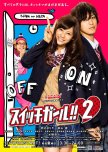
And yet, here I am writing a review for the 2nd season, after having marathoned through the first in one night and this one in the next.
The plot is full of cliches - from a narrative point of view, the 1st season was much better - with a little too much lingering on evil sex slave dealers laughing crazily and raising their malignant eyes to the skies. There have been moments I wished they would just go on with the plot (whatever that was), since the drama only has 4 hours time to tell it.
The force of this show is therefore not in the plot, but the characters. Nika, our heroine, is possibly the most adorable being in the northern emisphere. I simply love her. Not because I can rely, or because she's realistic, or because she's flawed but for a combination of those and an amazing ability to surprise me. I couldn't stop laughing at her antics, her sitting in the middle of a square crying about her pubic hair showing from under her underwear. The second after, I would empathize with her. Yes, she's a crazy character whom you can either love or hate, but not ignore.
Arata is the silent hero every girl dreams of, and the chemistry between these two is quite striking if you think this drama is romantic despite having no such ambition.
All the side characters are insane and some deliciosuly hilarious. The villains, on the other hand, are so stereotyped they are forgotten the moment they are out of the screen.
Music is nothing special in this one, while I thought it was quite well chosen in the 1st season.
All in all, I am ready to recommend this drama to:
1. clever people who have put their brains in the fridge for some time to recharge it and don't want to use it for a while
2. fans of Renn Kiriyama (someone has called my name?) and/or Nishiuchi Mariya
3. girls who want to learn what to avoid before a romantic evening with their boyfriend, such as wild hair removal or litres of aphrodisiac perfume
4. lovers of manga-like, over the top comedy
If you're one of the above, enjoy your watch!
Was this review helpful to you?
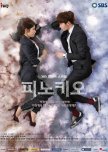
Pinocchio's story is intriguing, very captivating, well written and highly thought-provoking. It's also very well executed, in terms of acting, camera work and plot development. I enjoyed all episodes and was eager to watch the next.
So why have I given I Hear Your Voice a full 10, and bestowed this one a "mere" 8,5?
In rating a drama I always try to be as objective as I can be - try being the key word. A show that awakens the intellect deserves high scores, but it's the emotional share which earns it a perfect score. I was intellectually very engaged by Pinocchio, but I felt slightly detached when it came to the heart. Among other things, the romance didn't make my heart flutter, not even once. Honestly, I can't even pinpoint a reason for this: Park Shin Hye and Lee Jong Suk are both beautiful, very sweet in a puppy-like way, their respective characters lovable and their love story believable. And yet, it seems to me it lacked romantic tension, it was like watching two cute people in a commercial for shoes, or coats.
The moment they stopped being on screen, in my mind they also stopped being a couple.
On the contrary, I think Hye Song and Soo Ha are still dating, overcoming their differences and being happy together. I could mention many other drama couples that, to me, are still a reality somewhere in that evanescent world created by fantasy and therefore linger in my heart. Dal Po and In Ha are not among them.
Nobody's fault, mind you. The acting of all was above average and I was positively impressed by Park Shin Hye's performance. It must not be easy to interrupt every other sentence with a hiccup and make it sound believable. Her character isn't a champion of resolution, but she's very sweet and I liked her a lot. Lee Jong Suk is clearly a rising star in the drama world and can play this kind of role better and better. I loved the supporting cast, villain(s) included.
The music didn't make much of an impact on me either.
To explain my re-watch score, I'm going to confess a weak spot of mine: when a particular scene has a strong impact on me, I can't help but watch it again as soon as the episode is over. I haven't done so with any of Pinocchio's scenes. I may re-watch the entire show one day, but for now this ride, as much as it was enjoyable, is over.
Was this review helpful to you?
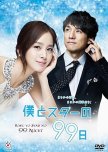
And yet, I loved it! I marathoned through it in a couple of days, and enjoyed every episode. I laughed, smiled, grinned. One may object that a drama is either good and to our liking, or it isn't. But the reasons why I like watching something aren't always as clear-cut and defined as I would like to think: I can remain cold in front of a masterpiece, and be enthusiastic of a piece of trinkets.
Hence my tepid marks, which reflect what I hope is an unbiased estimation, not the degree of my liking it.
Fact is, I truly loved the characters. Kohei, the bodyguard played by Nishijima Hidetoshi, is incredibly endearing. I had never seen this actor on screen before and at first sight I thought he was the complete opposite of an eye-candy. But his character is so sweet and lovable, I ended up liking him a lot. Kim Tae Hee, whom I could barely tolerate in My Princess, is adorable here, contributing factor the Japanese language, which renders her voice deeper and more pleasant.
The great actor Takanabe is hilarious. He seems vain and utterly stupid, but we soon discover he hides his own complex, and from that moment on, I dare everyone not to root for him, if not as a lover, at least as a friend and professional actor.
All the other characters do a good job, including Taecyeon, who surprised me with his very good Japanese. The bad guys aren't given enough screen time to get on our nerves.
The music is fine, mostly in the second half of the drama.
Surprisingly, I think I'll rewatch this drama one day. It was a perky watch, which I recommend to whomever is in need of something light, funny, romantic without being melodramatic or mushy.
Was this review helpful to you?

Sore wa, Totsuzen, Arashi no you ni..
25 people found this review helpful
Despite the premises though, there is something about this drama which made it into one of my favourites in its genre.
Perhaps because on further analysis it doesn't deal with falling in love with someone, but with learning to love oneself and appreciate the little, daily things one gives for granted.
Esumi Makiko is so beautiful here, one soon forgets the age gap. The story revolves around her, her internal struggle, her doubts, her self-esteem. Yamashita Tomohisa plays his part very well too, portraying a young man in that fragile phase between adolescence and adulthood in a very believable way.
Overall, a delightful, suave drama.
Was this review helpful to you?

Fact is, for once I've decided to write a review which is very personal and not at all objective. It's based upon the emotions it gave me, not the cinematographic quality of the drama.
Also, I think it's necessary to say that among the 3 versions of the same story, this was the last I watched, despite its being the first live-action based on the popular manga.
And while I consider the Japanese version the best one regarding acting and music and the Korean one better in terms of photography, colours and characterization, I'm ready to face criticism and admit that the Taiwanese version was the most satisfying to me on a romantic level.
The chemistry between Shan Cai and Dao Ming Si is what makes this into a worth watching show. For the first time, I was not rooting for the heroine to end up with the second lead, but for the main couple to finally be together. While watching hana Yori Dango and Boys Before Flowers I found myself constantly thinking: throw that arrogant brat away and choose Rui, or Ji Hoo!
You are allowed to laugh.
I ascribe this to the actors and the way their interactions were portrayed.
While Shan Cai can be annoying at times, she is a consistent character and once she finally realizes who she loves - it takes her some time - she is truly convincing. The same can be said about Dao Ming Si, whose candour as a besotted lover is quite endearing.
Therefore, although I recognize this show is pretty cheap when it comes to costumes, screenshots, photography and overall acting, I still have a fond memory of it and will probably rewatch it in the future.
Was this review helpful to you?
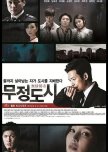
I understand where this plot wants to go, and I even appreciated – to some extent - the never-ending shifts of most characters from one side to the other, when not somewhere in between. However, it gets a little surreal in the long run, to the point that the unpredictable becomes predictable: once you know nothing is as it seems, you're prepared to think the opposite of what they want you to think – hence seeing through the smoke curtain. Therefore, if it weren't for the heartthrobbing Paksa Adil and all the scenes he's in bar none, this drama would be a sequel of police actions going askew either because some corrupted high power butts in or because they are as incospicuous as a baobab tree in the desert. Not to mention the nth old, or fat, or old and fat villain sitting on some baroque chair and acting like a lunatic buddha ordering this or that killing. I need to confess: at times I yawned. And why do the powerful and corrupted always meet at Japanese restaurants? Does sashimi embody the "raw" quality of the Korean politics?
Unfortunately, there's no way to explain the faults of this plot without spoiling it. Suffice to know that I stopped watching it for the plot and just went for the way scenes were shot and acted. Now, if it were possible to rate direction and cinematography in particular, it would be a completely different story, since the drama is visually and technically impeccable. Attention to details, colouring and the use of light – or lack thereof - all are spot on and intensely evocative. I found many of the characters extremely interesting, constantly fluctuating between dark and shade – light is completely absent here – and the acting by Kim Yoo Mi and Choi Moo Sung impressed me no end. Kim Yoo Mi in particular gives life to an amazing character, extremely stubborn as a "boss" and wonderfully human as a woman. My liking of her character is all due to her acting, because, let's face it, the poor actress's actions consist mostly on moving from an armchair to a sofa with a glass of whisky in her beautifully manicured hand. It's therefore the subtle changes of her face that tell her story.
As for Jung Kyung Ho's, it'd deserve a review on its own, so mesmerizing it was. His character is the best written one: you can peel off layer after layer and there's still something to find. The actor's take of it, suavely ruthless and gracefully tormented, makes his Doc's Son into one of those unforgettable characters who are going to stay with you for a very long time. Without him, this drama would be nothing more than a morbid, blurred photograph of an improbable criminal world. His onscreen chemistry with Nam Gyu Ri and his "putative family" is palpable and great to watch, but then again, I think this actor would have great chemistry with a tree trunk, if needed.
On the opposite side of the spectrum there's Ji Hyeong Min, the super cop who got so much on my nerves I want to forget him with all my might. He goes from being as likable as an ingrown nail to suddenly grasping the situation to no avail whatsoever. Truth be told, the whole police force – the official one, that is – could have heavily contributed to the comic if this drama had a comic intention, which it doesn't. The level of corruption and the number of undercovers borders on ridicule.
The soundtrack is classy, powerful, always appropriate. In short, marvelous.
I am not going to rewatch this drama any time soon, if ever. Intense but frustrating, it is the kind of experience which leaves me with a bitter taste in my mouth, since the ultimate meaning of it seems to be that justice is a mere word, a utopia for philosophers and dreamers. I have no doubt this is so in real life too, but at least when dealing with the world of fiction, I'd rather be deceived.
Was this review helpful to you?
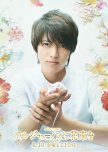
Ironically, it had been sitting in my ptw list for a good year, waiting - so I thought - for me to be in the right mood for its somehow heavy subject. It came as a big surprise that this was the perfect moment and Algernon ni Hanataba wo is the show that finally reminded me why I fell in love with Asian dramas in the first place and became an addict so many years ago.
It enchanted me and pulled me into its world five minutes in. I hadn't even realized I was marathoning with bated breath until I exhaled.
The show is built on two different levels: the plot itself with its events and the story told by the characters. These two levels aren't of equal importance, that is, if you watch for the events it may disappoint you, as it suffers from the typical Japanese brevity and sudden, unexpected turns. However, this drama is meant to be valued for the thoughts it provokes and the way it does so, hence my perfect mark.
I won't lie, it made me cry. A lot.
This is a beautifully heart-wrenching story of diversity and the need to conform, be 'equal'. While most of us aim at being smart enough to earn more, have success in life and even wallow in our self-esteem, Sakuto dreams of becoming intelligent for the people around him to love him. This makes his journey all the more tragic, since it inevitably raises the question whether he was happier when only half cognizant of his surrounding or when he fully grasped the meaning of everyone's motivations and finds out that being a genius can be a sentence to loneliness. It also heavily probes on the benefits of intelligence when it's attained at the cost of humanity, empathy, compassion and even love.
I believe each single character in this drama has a precise purpose in terms of typecasting the different approaches to what is generally considered 'normal'. Here's a word I hate when referred to human beings, but it is the core of this tale, in its literal meaning of 'conforming to the norm'. This means that all the characters revolving around Sakuto find their justification only in connection with him, they represent the wide range of 'normality' as opposed to the extremes Sakuto's going to experience.
Which is not to say that they didn't act well. Quite the opposite: what fascinated me here is the fact that each actor played its part in a different way, according to his/her role in Sakuto's life. The same can be said about the direction, which plays a precise role too with its use of symbolism, archetypes, flowers, colours, camera focalization. Even Algernon is a great character. Tiny details are everything but irrelevant, a trait I always, highly appreciate.
And at the risk of being called biased, I maintain Yamashita's acting is impressive here. I was deeply moved by the sheer movement of his hand, the subtle, slow changes in stance, walk, gaze. I loved Sakuto as a viewer, as a woman, as a mother, as a sister, as a friend, to the point I desperately wanted to hug him and never let go. I could go on, but I'm becoming verbose and perhaps a little too emotional too.
The music is the only trait of the drama that gets a mere passing grade. I wish Japanese shows in general would put on their Osts the same amount of effort they spend on photography and characterization. The only song played here is very suitable to the story, but repetitive to the point of losing all its impact.
I've already rewatched many scenes soon after completing an episode. I simply couldn't help it. There's no doubt in my mind I'm going to re-watch the whole drama soon enough, certain it will lose none of its emotional impact on further viewing.
Was this review helpful to you?
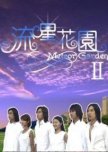
The constant comparisons won't help; on the contrary, they'll spoil the fun. All in all, I DID enjoy this second season of Meteor Garden. The acting of all has improved tremendously, and so are photography, direction and characterization.
Meizuo and Ximen's side stories are addressed and completed, something I thought was sadly lacking elsewhere. Shan Cai grows into a truly likable character and the second female lead is, for once, a delicious person, instead of the usual viper-like, scheming character. So refreshing! Honestly, I've had enough of girls portrayed as if they were incapable of true friendhip or generosity and who seem to live only to target the guy of their dreams. In this sense, this second season is way more romantic and realistic than many other adaptations.
It has some dragging parts, mostly when the whole plot is compared in length to the pretty rushed ending, but as a counterpart to this, some details are truly satisfying (I can't elaborate this unless I spoil the end).
Overall, I am convinced this drama is much better than what's usually expected and deserves a try.
Was this review helpful to you?
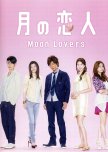
I watched it as soon as it finished airing, attracted by one of the best actors assembly I had come across in a long time. And true to their skills, they do an amazing job, given the luke-warm, inconsistent, shallow story they had to work with.
I understood none of the characters. Are they ambitious, serious, romantic, evil, malicious? No idea. They are all a mixture of those. Yes, in real life people are never clear-cut, but instead of coming out as imperfect human beings one can identify with, these characters appear like badly assembled patchwork quilts, behaving in a way one episode, the opposite way in the next.
The only character with a little consistency is Maemi, played by an impeccable Shinohara Ryoko.
Without spoiling the ending of the drama, suffice to know that it was so out of the blue, I could do nothing better than scratch my head in puzzlement.
What happened to that character? Why did that one act the way he did? What are they trying to say? What's the answer to that 4-coins quiz repeated to exhaustion?
All questions I found no answers to.
I can't remember the music. In these cases, I always end up giving it a non-committal 7. It certainly didn't blow me away.
What a pity.
Was this review helpful to you?
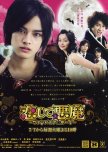
On the other hand, for someone like me who is only mildly interested in vampires and the whole sarg-sleeping, cross-shunning, blood-sucking process, this drama was a lot more enjoyable than I had expected.
I liked the way the issue was approached, presenting the vampires as a decadent, declining, arrogant race who watches the humans with a mixture of desire and deep distaste, boarding on disgust.
It makes it all the more touching when the cards are turned on the table and the one who thought himself superior is treated with contempt for his being different, a "monster".
I confess at being invariably deeply affected by the issue "difference", and how people treat those who don't conform to the norm, either for their skin colour, their beliefs or lack thereof, their behaviour, their look. There are a couple of scenes in this dorama which are still vivid in my memory because they were intensely moving. They made me think once again of how cruel people can be when they ignore and how easy it is to be judged abnormal.
So, although the acting is far from stellar and the plot at times inconsistent, I do believe this show deserves more attention than what it got.
Was this review helpful to you?
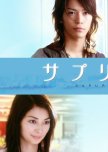
The plot is neither shallow nor particularly predictable. Until the end, the viewer does not know if the romance between the leads will have a future or not, because apart from the age difference - which isn't that big anyway - there are other, more important obstacles: opposite stances towards work and life in general, different social status, dissimilar goals. The good aspect of this love story based upon differences is that both learn one from the other. It's not the dramatic change of one of them overnight, in the name of love or another equally unrealistic reason.
The best part of the plot lies in the dialogues, though. They are clever, at times hilarious, at others quite deep. I loved learning of the process behind the creation of an advertisement, and why those people are often referred to as "the creatives".
The acting was very good, although I must admit at not having been swept away by Itoh Misaki's performance. There were times when she felt wooden and unconvincing. This lowers my acting mark to an 8, which would have been otherwise flawless, since everybody else did a great job, including Kame.
The music isn't my favourite, but it was chosen with great sense and is very fitting with the story told and the setting.
The photography deserves a mention too: there are some beautiful screen shots throughout this show. I can still see them with my mind's eyes today, more than 4 years after I've watched the drama. They are meant to create a visual pattern, parallel images which create a nice contrast between the incompatibility of the two main leads in the world of words, and the harmony between them on a more emotional level.
I will rewatch it. It gave me an energy shot at the time, therefore I keep it for future need of the same.
Was this review helpful to you?
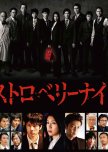
This drama starts in the very middle of things. Unless you have watched the 2010 special - which I haven't yet - you won't see any introductions, neither of the characters, nor of the setting. You are thrust into the first crime and given brief flashes of the characters' past, pieces of a puzzle you'll only complete by the end, and not in full. It's realistic, harsh and frustrating, but it worms its way into the viewer's interest in a very subtle, gradual way, until you come to the end and wish there were another entire season to watch at once.
The cases brought me more than once to the brink of tears. They are desperate and intense, involving such human characters I couldn't remain detached even if I wanted to.
The cast is downright brilliant. My favourite Takeuchi did not disappoint me. Her character's very complex, with a perpetually seething anger as palpable and incomprehensible at the beginning as it is understandable once her past is slowly revealed. I have a weakness for characters who are incapable of expressing their feelings, because when they finally let the slightest glimpse of vulnerability surface it's so much more intense and heart wrenching.
Which inevitably leads me to her loyal subordinate Kikuta, portrayed by an impeccable Nishijima Hidetoshi. He reads her without fail, and I love that his evident attraction to her originates from his admiration for her skills rather than a simple man/woman dynamic.
Some of the characters are downright irritating. The police director - whose role is quite a mystery to me - is so obtuse the sole purpose of his existence seems to be to provoke his detectives' reaction. While it works on a dramatic level, I hope such individuals do not exist in real police departments, or I'd give up on the Japanese justice entirely, mostly if he's paired with the older corrupt detective whom I wanted to punch in the face.
Good or bad, none of these characters left me unmoved, proof of their outstanding job here.
I loved the music: well chosen, well used, well balanced.
Re-watch value is very high, because at first viewing I found some details hard to follow, mainly because of the fast delivered lines and the unusual way the crimes unfold. Most of all, though, I am experiencing withdrawal symptoms regarding the characters and am looking forward to a continuation. I'd vote for a second season in no time.
Was this review helpful to you?


 2
2



















